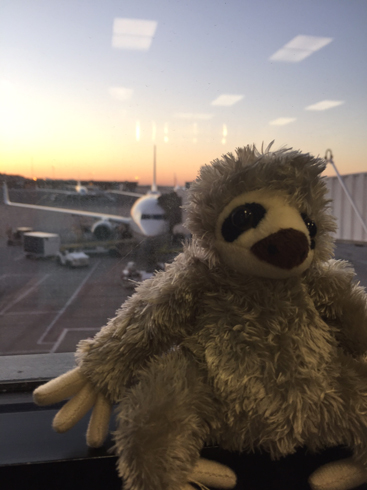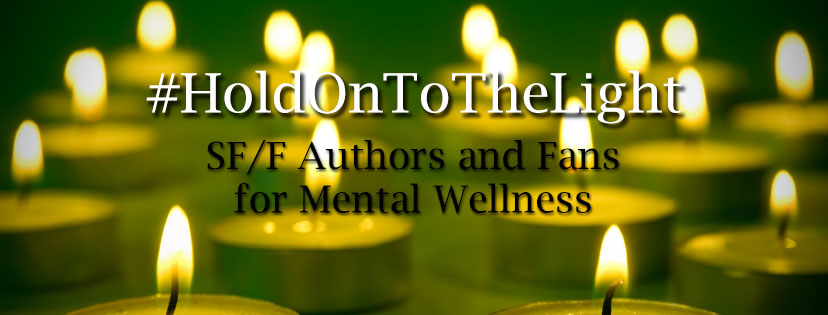Definition of Agoraphobia, from Merriam-Webster.com:
:abnormal fear of being helpless in a situation from which escape may be difficult or embarrassing that is characterized initially often by panic or anticipatory anxiety and finally by the avoidance of open or public places
Hi. I’m Beth Cato. I’m agoraphobic. It’s part of my sampler pack of mental issues, including depression, generalized anxiety order, and obsessive-compulsive disorder. I’m going to focus on agoraphobia today as it is discussed less often than the others. (If you want to listen to me delve into this topic, it also came up in my interview with Mur Lafferty on the I Should Be Writing Podcast.)
What is agoraphobia?
The Greek roots of the word translate to “fear of the marketplace.” It essentially means a person has a deep fear of leaving home or other select safe zones. It also means a deep fear FOR those safe zones, like heightened anxiety when away because the oven might be left on/house will get broken into/cat will explode. It’s complex and different people experience it in different ways.
Agoraphobia isolates a person, and keeps them isolated. Yeah, it can be embarrassing sometimes. A lot of other people don’t get it or don’t want to make an effort to understand. For me, going out and doing errands isn’t a spontaneous act. It’s one that requires careful planning, and sometimes days or months of preparation.
How can it be treated?
Prescription drugs may help, as they do with other anxiety disorders. Personally, I rely on coping strategies and rigorous planning. Yeah, I still have limits on what I can do, sure, but I’m fairly happy, stable, and I am actually getting out of the house. I’m in a much better place than I was ten, fifteen, twenty years ago.
How does agoraphobia impact a writing career?
How doesn’t it? I want to sell what I write. That means I need to communicate with people and it also means I need to escape the house at times and attend conferences and travel.
Driving is hard for me. I don’t even like being a passenger, especially in big city traffic. I have only had my license for about 10 years now and I am only comfortable driving within a small radius of home and during the daylight. Most bookstores around Phoenix are well beyond my cozy radius and require passage through downtown with its multitudes of lanes and confusing exits and mergers.
 How do you get to these events, then?
How do you get to these events, then?
I try to line up the majority of them with my husband’s schedule and we make a family trip out of it. If I have to make it on my own, I plan around rush hour and otherwise prepare myself as much as possible. I have found Super Shuttle is fantastic to get to and from the airport.
Why do you go to conventions if it’s so hard on you?
Because I love conventions and panels and geeking out over books! You can love something and be terrified about it at the same time. Conventions give me a rare chance to hang out with friends. I soak that in.
I try to stress out in advance and plan out everything as much as I can. That way, I get there and I can enjoy myself.
How do you plan ahead?
This is where my OCD plays a helpful role. Starting months ahead of time, I will study where I will be. How to get from the airport to my hotel and back. What is in walking distance of my hotel and the convention center or other venues. I hit up Yelp and start bookmarking restaurants with food that I like. I study Google Maps and find more restaurants and other cool stuff. Then I go down to Street View, and explore how it looks on the ground (i.e. does it look safe, are there crosswalks, how do I get from here to there, etc). If there are guidebooks available, I buy and study them. If there are Facebook pages about the con, I lurk and take in all the info I can get.
I essentially try to become as conversant as a local. I know routes. I can recommend restaurants based on their popular dishes or friends’ dietary needs. I have Lyft and Uber apps so I can get around (because I sure am not renting a car) or I know when the local transit runs.
Does this usually work?
Most of the time, yes! Mind you, I can’t plan for everything. Sometimes, you gotta lock yourself in a bathroom stall to quietly experience a panic attack, then dry off your face and go out to Adult again.
But when you’re home, you’re fine?
I’m still me. I’m happily neurotic. The internet does make it easier to communicate. I can avoid using the phone–oh, I hate the phone! Except when my agent calls. Her calls are almost always wonderful. Sometimes emails are difficult and I require a few hours or days to work up nerve to reply. I add tasks like that to Habitica, a role-playing game-styled to-do organizer, so that I don’t forget.
Here’s the thing. I have disabilities. I deal with them as best I can. Does it suck sometimes? Sure. But am I happy? Most of the time, yes! Ten years ago, I would have NEVER imagined I would be traveling by myself all over the country and being as active as I am on social media. I never would have written a post as personal as this, either, but I sincerely hope it helps other people out there.
About the campaign:
#HoldOnToTheLight is a blog campaign encompassing blog posts by fantasy and science fiction authors around the world in an effort to raise awareness around treatment for depression, suicide prevention, domestic violence intervention, PTSD initiatives, bullying prevention and other mental health-related issues. We believe fandom should be supportive, welcoming and inclusive, in the long tradition of fandom taking care of its own. We encourage readers and fans to seek the help they or their loved ones need without shame or embarrassment.
Please consider donating to or volunteering for organizations dedicated to treatment and prevention such as: American Foundation for Suicide Prevention, Hope for the Warriors (PTSD), National Alliance on Mental Illness (NAMI), Canadian Mental Health Association, MIND (UK), SANE (UK), BeyondBlue (Australia), To Write Love On Her Arms (TWLOHA) and the National Suicide Prevention Hotline.
To find out more about #HoldOnToTheLight, find a list of participating authors and blog posts, or reach a media contact, go to http://www.HoldOnToTheLight.com and join us on Facebook.
#SFWAPro






